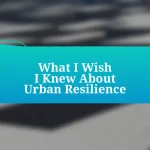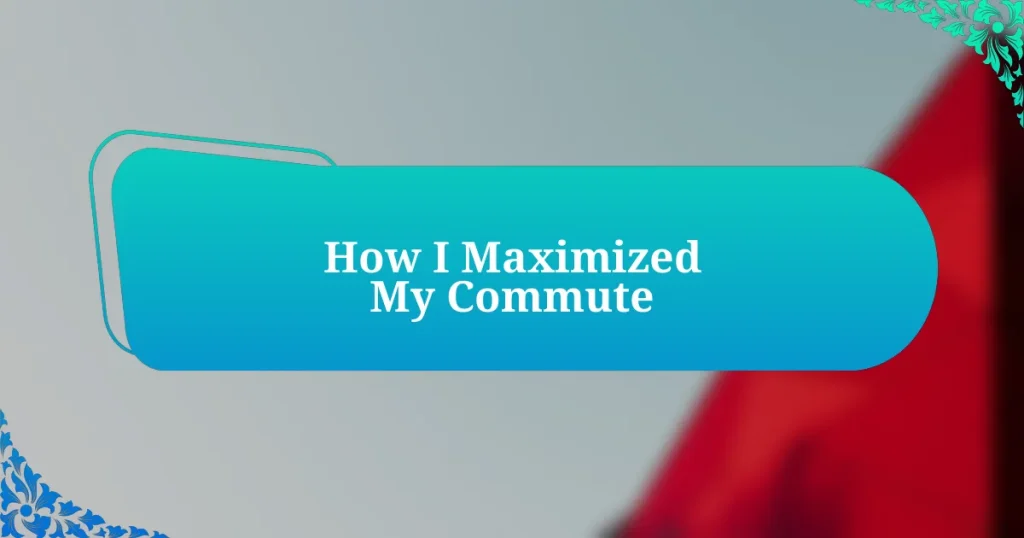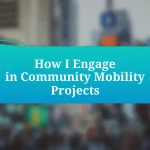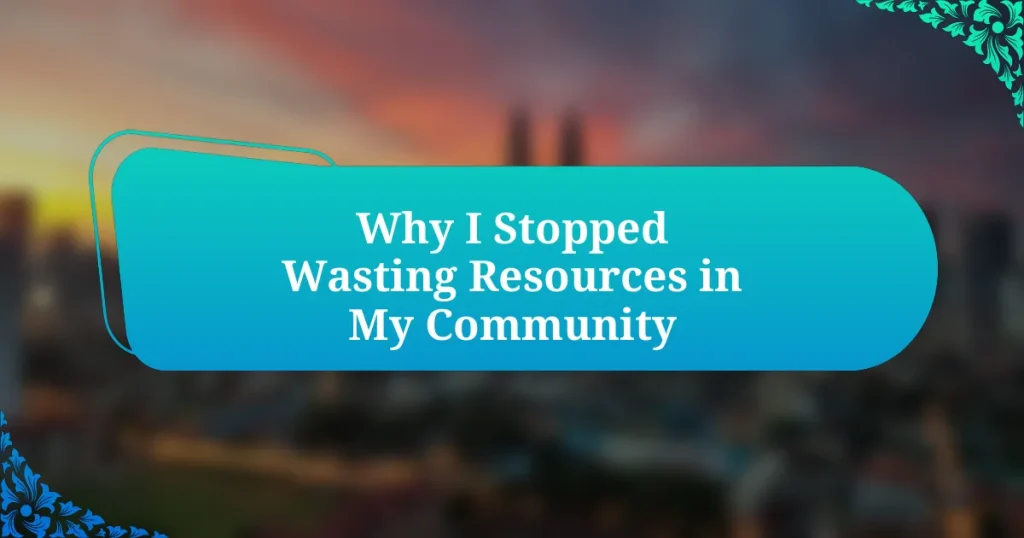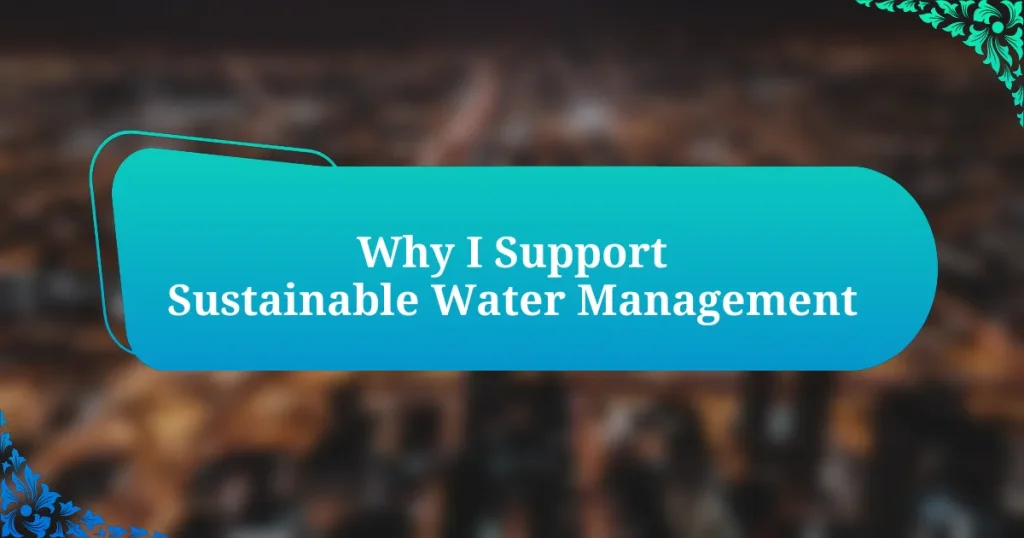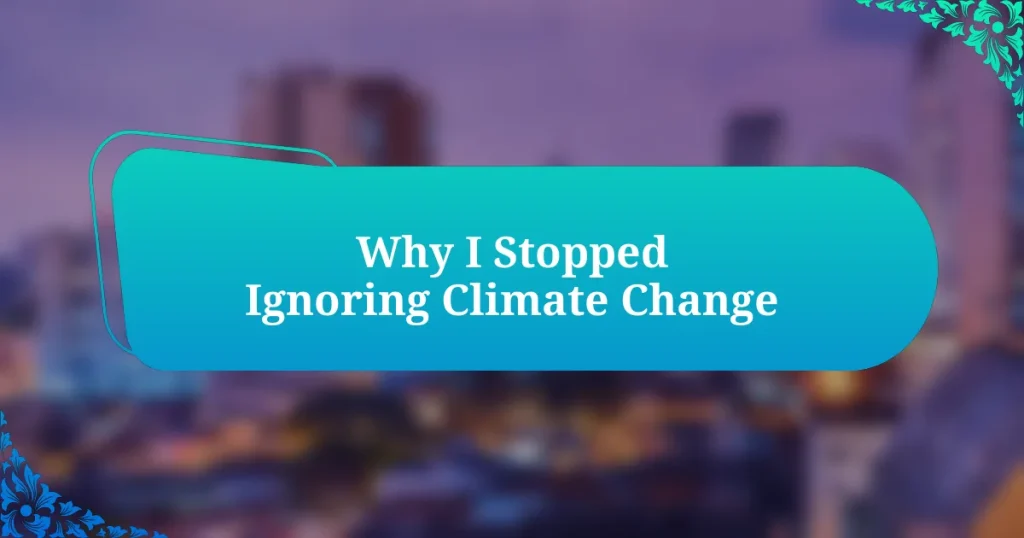Key takeaways:
- Smart city technology enhances urban living by improving services like traffic management and air quality monitoring, leading to a more responsive and sustainable environment.
- Maximizing commute time can transform it into opportunities for personal growth and social connections through activities like listening to podcasts and engaging with fellow commuters.
- Flexibility and the use of apps for navigation, ride-sharing, and productivity can significantly optimize commuting experiences, reducing stress and enhancing enjoyment.
- The future of smart commuting looks promising with advancements like autonomous vehicles and real-time data integration, promoting sustainability and better urban planning.
Author: Clara Whitfield
Bio: Clara Whitfield is an acclaimed contemporary author known for her poignant storytelling and evocative prose. With a background in psychology, she intricately weaves themes of human emotion and personal growth into her narratives. Clara’s debut novel, The Echoes of Yesterday, received critical acclaim and garnered her a loyal readership. When she’s not writing, Clara enjoys exploring nature and visiting local coffee shops, where she often draws inspiration for her next story. She currently resides in Portland, Oregon, with her two rescue dogs.
Understanding Smart City Technology
Smart City Technology fundamentally reshapes how we interact with our urban environments. It’s fascinating to see how services such as traffic management and energy use are enhanced through real-time data. I remember when my commute turned from a frustrating ordeal to a seamless journey, thanks to an app that used live traffic updates.
As I engrossed myself in the world of smart cities, I often wondered how these innovations could help reduce my stress levels. For instance, leveraging intelligent public transit systems not only minimizes wait times but also encourages more people to choose eco-friendly options. It was amazing for me to see how integrating technology can make our cities more livable and efficient.
Moreover, engaging with features like smart streetlights that adjust based on pedestrian movement opened my eyes to a more responsive urban landscape. Have you ever considered how many resources could be saved with such adjustments? I felt a distinct sense of relief knowing that these advancements are actively working toward a more sustainable environment, creating a community that feels safer and more accessible for everyone.
Importance of Smart Cities
The significance of smart cities goes beyond just improving technology; they fundamentally enhance the quality of life for urban inhabitants. I remember a particularly sweltering summer when the air quality in my city plummeted, making it almost unbearable to step outside. With the implementation of smart monitoring systems, we now receive real-time data on air quality, empowering me and my neighbors to make informed decisions about when to venture out or stay in. Just think about the peace of mind that can bring!
Additionally, smart cities play a crucial role in economic growth. They attract businesses by creating efficient environments that streamline logistics and reduce overhead costs. I’ve witnessed firsthand how local startups began to flourish as our city adopted a more connected infrastructure. This not only generated jobs but fostered a vibrant community spirit, encouraging collaboration among residents.
Moreover, it’s inspiring to see how smart technologies promote inclusivity. By integrating features like accessible public transport and tailored information for individuals with disabilities, cities become spaces that truly cater to all their residents. Reflecting on my own experiences, I feel a deep appreciation for the efforts being made to ensure that no one is left behind. When cities prioritize inclusivity, everyone benefits, fostering a sense of belonging that is invaluable in today’s fast-paced world.
Benefits of Maximized Commute
Maximizing my commute has transformed what used to feel like wasted time into opportunities for growth and learning. I often listen to audiobooks or podcasts that pique my interest, turning that otherwise dull drive into a personal development session. Isn’t it amazing how we can reshape mundane moments into something enriching?
Another benefit I’ve noticed is the boost in my mental well-being. Rather than dreading the traffic or crowded trains, I’ve developed a routine that includes mindfulness exercises during my commute. This practice has helped me arrive at my destination feeling more centered and ready to tackle the day. Have you ever considered how a shift in perspective could make that daily grind feel less burdensome?
Lastly, I find that maximizing commute time allows for greater social connections. Whether it’s networking with fellow commuters or using travel time to catch up with friends through voice chats, these interactions deepen my relationships. This connectivity, born from shared experiences in transit, brings a sense of community that really enhances the overall commute experience. How often do we overlook the chance to connect with others who are on a similar journey?
Tools for Smart Commuting
The right tools can significantly enhance your commuting experience. I often rely on navigation apps to check traffic conditions before I hit the road, saving me from unexpected delays that used to frustrate me. It’s interesting how these simple tools can give me a sense of control, isn’t it?
In addition to navigation, I’ve found mobility apps incredibly useful. They allow me to plan multi-modal journeys that combine biking, public transport, or even car-sharing options. This flexibility not only aids in avoiding congestion but also aligns with my sustainability goals. Have you ever thought about how exploring new routes can change your daily routine?
Don’t forget about productivity tools, too. I make good use of note-taking apps during my transit time, jotting down ideas that come to me while I’m in motion. It transforms my commute into a productive brainstorming session, leaving me eager to implement those ideas once I arrive. How empowering is it to capture inspiration at any moment?
My Commute Experience
My daily commute has become a blend of routines and revelations. On particularly hectic mornings, I used to dread the overcrowded subway, feeling the weight of impatience wash over me. But I found a surprising solace in the ebb and flow of the crowd; it’s a shared experience, a collective journey that reminds me I’m part of something bigger. Have you ever noticed how a simple moment of connection with a fellow commuter can brighten your day?
Every now and then, I make it a point to leave a bit earlier and embrace the unpredictability of my surroundings. Recently, I took a different bus route that led me through a charming neighborhood I’d never explored. The quaint shops and vibrant street art ignited a spark of curiosity in me, making my commute feel less like a chore and more like an adventure. It’s a reminder of how little changes can introduce delightful surprises, don’t you think?
Technology has also played a crucial role in transforming my commuting experience. With real-time updates on my smartphone, I feel empowered to make quick decisions that affect my journey. Last week, an alert about a delay prompted me to switch to my bike, allowing me to enjoy the fresh air while staying on schedule. It was invigorating, creating a perfect balance between efficiency and enjoyment. Have you ever realized how the right tools can turn a mundane journey into an inspiring one?
Strategies to Optimize Commute
When it comes to optimizing my commute, I’ve found that flexibility is key. There was a time when I clung to my usual schedule, but experimenting with different travel times has significantly reduced my stress. I remember one morning, I decided to delay my start by just twenty minutes. Oddly enough, that small change led to a surprisingly serene journey, with less congestion and the chance to enjoy a leisurely coffee at my favorite café.
I also leaned heavily on ride-sharing apps. For a period, I teamed up with a coworker to share rides, which not only cut costs but fostered a new friendship. It was fascinating to discover insights about each other during our drives—sometimes it felt like we were on an impromptu adventure rather than a mundane trip to work. How often do we miss the chance to connect over shared experiences like this?
Incorporating walking into my commute has also been a game-changer. I decided to hop off a stop early and take a scenic route home. The added movement not only refreshed my mind, but it also allowed me to explore hidden gems in my city. Have you ever considered how a few minutes of walking can shift your entire outlook after a long day? For me, it turned a stressful routine into a daily ritual of discovery and mindfulness.
Future of Smart Commuting
As I think about the future of smart commuting, I can’t help but feel excited about emerging technologies like autonomous vehicles. Imagine a seamless ride where I can catch up on work or enjoy a podcast without the stress of navigating traffic. When I think about it, this shift could free up valuable time for self-care or hobbies, transforming the often-dreaded commute into a rewarding experience.
Another fascinating aspect is the integration of real-time data into our daily travel decisions. Picture this: I wake up, and my smart assistant suggests the ideal transportation mode based on current traffic conditions and weather, allowing me to plan my day effortlessly. Leveraging these insights could honestly help not just individuals but entire communities optimize their schedules and reduce congestion. Wouldn’t that be a welcome change?
Moreover, there’s a growing emphasis on sustainability and eco-friendly commuting options. I remember the last time I rode my bike to the train station; the fresh air filled my lungs, and I felt invigorated. It made me think—what if urban planners create more bike lanes and green spaces to encourage this lifestyle? Such changes could promote healthier, more connected communities while also addressing climate concerns. How cool would it be to see our cities evolve into hubs that prioritize both people and the planet?










